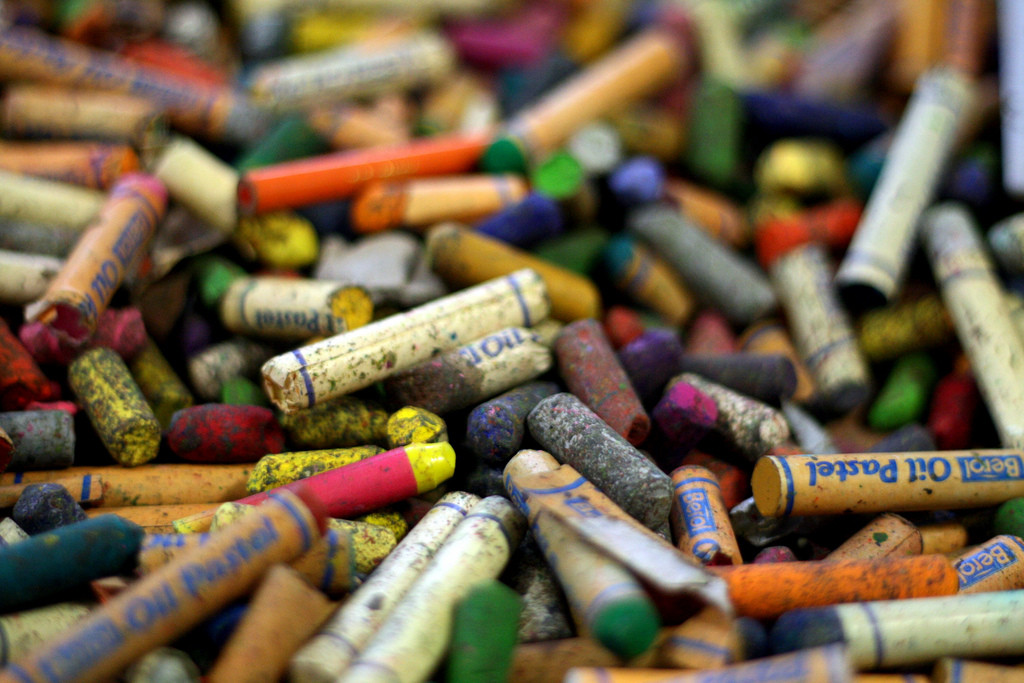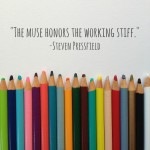
There’s a dried coffee spill on the kitchen floor. Dirty laundry is piled in the bathroom and the hall. My bike is parked directly behind me because I haven’t taken the time to put it elsewhere. I’m not exactly sure there is an elsewhere. At the desk where I write, I had to shove aside a stack of mail to make a place for my coffee mug. In the past, I never would have ignored the mess. I couldn’t overlook the ragged envelopes or the coffee spill. I would’ve tidied up and then lit a magnolia-scented candle to further improve the atmosphere. After all that, I would’ve had five minutes to write instead of an hour.
According to the internet, I should be cleaning right now. Minimalism and home organization are in, excess is out. Again. I read about it on blogs and see the evidence on social media—capsule wardrobes, pared-down possessions, the “right” way to organize your home. I understand its appeal. I came of age in a time of excess, when people filled the suburbs with McMansions, and Costco introduced shopping carts as large as French cars. Then I saw the economic fallout of that way of life. We all did.
Yet I find myself wary of the new minimalism and our preoccupation with tidiness. One reason is aesthetic. “Simplify” too much and your home has all the personality of a Travelodge. The photos I see on Instagram are beautiful but I start to wonder if everyone else’s homes are made of white posterboard and glowing with perpetual sunlight. Have we learned a lesson from materialism or have we traded one unattainable ideal for another?
The second reason for my skepticism is because the new minimalism comes with an old promise: Do this and you’ll feel better. Or worse: You won’t feel better until you do this. I’m not saying it’s untrue, but it is a slippery slope. This is a promise that once inhibited my creative pursuits. For years, I told myself that I couldn’t create unless I had a “clean canvas” (i.e. a tidy, well-organized environment). Before sitting down at my computer or my easel, I’d have to bring order to my surroundings. Needless to say, I spent a lot of time scrubbing countertops and not a lot of time writing or painting. I operated under the mistaken belief that a perfect environment is necessary for meaningful art. Furthermore, I thought that if I took the time to clean and develop the right system, I’d never have to do it again. Isn’t that what all the books and articles say? But if I’ve learned anything from domesticity, it’s this: Everything will get messy again. It’s a natural consequence of eating food and wearing clothes and spitting toothpaste into the sink.
Over time I’ve come to believe that the mess isn’t the problem. It’s my inability to coexist with it and create within it. Bit by bit, I’ve been learning. I haven’t stopped doing housework, but my priorities have changed. On the days I write, writing comes first. If I decide to paint, painting comes first. It’s not always easy because the “you’ll feel better” claim about cleaning is true. It’s an activity that offers instant gratification. It gives you something to check off. It offers evidence of productivity. What did I do in my free time? I brought order to that chaotic closet. See? The time I spend creating art (along with other activities such as reading for fun) doesn’t offer the same evidence or the immediate sense of accomplishment. I’m learning to be ok with that.
If you’d like to hear from someone else who’s making peace with clutter, I recommend this article by Dominique Browning in The New York Times. Ultimately, Browning identifies more strongly with her material possessions than I do but she raises some interesting ideas about our relationship with “stuff.” For instance, she suggests: “It is time to celebrate the gentle art of clutter. We live, and we pick up things along the way: the detritus of adventure; the vessels of mealtimes; the books and music of a life of the mind; the pleasures of our daily romps through the senses.” (Dibs on the name The Detritus of Adventure for my future sailboat.) At the very least, her ideas made it easier for me to overlook my crowded, dusty bookshelves on the way to the computer this morning. I’ll get to them eventually, but not first.




This is great, Andrea. I’m definitely a proponent of the minimalist lifestyle (but not a cold, impersonal one) and do believe that getting rid of clutter can “make you feel good” BUT I also think it’s taken on a too trendy, one-size-fits-all feel. Above all, we should all do what works best for us. Maybe that looks like consistently de-cluttering and putting that before all else for some, maybe not for others.
For me, I always find that the creativity comes to me at the most innapropriate times. Often, it’s not when I’m asked or told to do something, but when I’m in an inconvenient position and am forced to find a solution. On an everyday level, I usually get the urge to write when I’m sitting in a towel, freezing, after showering. Or on a larger level, when everything I planned fails to come to fruition and I’m forced to get creative and figure it out from there.
I’m on a bit of a tangent now but I loved this and am looking forward to reading that NYT article. Thank you!
Thanks, Robin! I always enjoy reading your take on the minimalist lifestyle, especially as it relates to being a more thoughtful, intentional consumer. There are a lot of good lessons to be learned from minimalism. But I agree, it’s the one-size-fits-all mentality it has taken that leaves a bad taste in my mouth. It’s probably partly because I’m a recovering perfectionist and I want someone to tell me it’s ok to not have a color-coded spice cabinet. That said, earlier this week I cleaned and organized my kitchen before my writing time. Sometimes the dishwasher just needs to be loaded and sometimes you can let it go
Love your take on this subject, Andrea! In a way I want to plug my ears because I would much rather feel accomplished and clean by tidying “all the spaces” before sitting down to creativity in the many ways I enjoy it. And sometimes that is entirely necessary! Minimalism and decluttering have exercised a life-long pull over me and I still see much value in both. The problem is when that pull is an unhealthy one that dominates rather than serves me. There will always be things to clean and organize. Of that we are certain. But the principle holds that it is more important to learn when the right time to deal with the clutter is and when to move on and live in the meantime.
And that is just what I needed to hear.
Thanks for sharing, Bethany! Great thoughts I especially like the last thing you said: “it is more important to learn when the right time to deal with the clutter is and when to move on and live in the meantime.” That’s definitely a lesson I’m continually learning. Sometimes you deal with the mess and sometimes you continue working and creating in the midst of it.
I especially like the last thing you said: “it is more important to learn when the right time to deal with the clutter is and when to move on and live in the meantime.” That’s definitely a lesson I’m continually learning. Sometimes you deal with the mess and sometimes you continue working and creating in the midst of it.